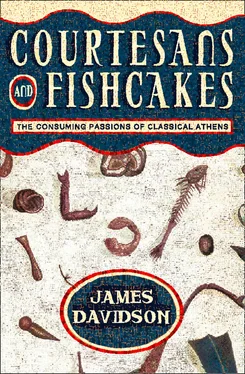James Davidson - Courtesans and Fishcakes - The Consuming Passions of Classical Athens
Здесь есть возможность читать онлайн «James Davidson - Courtesans and Fishcakes - The Consuming Passions of Classical Athens» — ознакомительный отрывок электронной книги совершенно бесплатно, а после прочтения отрывка купить полную версию. В некоторых случаях можно слушать аудио, скачать через торрент в формате fb2 и присутствует краткое содержание. Жанр: unrecognised, на английском языке. Описание произведения, (предисловие) а так же отзывы посетителей доступны на портале библиотеки ЛибКат.
- Название:Courtesans and Fishcakes: The Consuming Passions of Classical Athens
- Автор:
- Жанр:
- Год:неизвестен
- ISBN:нет данных
- Рейтинг книги:3 / 5. Голосов: 1
-
Избранное:Добавить в избранное
- Отзывы:
-
Ваша оценка:
- 60
- 1
- 2
- 3
- 4
- 5
Courtesans and Fishcakes: The Consuming Passions of Classical Athens: краткое содержание, описание и аннотация
Предлагаем к чтению аннотацию, описание, краткое содержание или предисловие (зависит от того, что написал сам автор книги «Courtesans and Fishcakes: The Consuming Passions of Classical Athens»). Если вы не нашли необходимую информацию о книге — напишите в комментариях, мы постараемся отыскать её.
Courtesans and Fishcakes: The Consuming Passions of Classical Athens — читать онлайн ознакомительный отрывок
Ниже представлен текст книги, разбитый по страницам. Система сохранения места последней прочитанной страницы, позволяет с удобством читать онлайн бесплатно книгу «Courtesans and Fishcakes: The Consuming Passions of Classical Athens», без необходимости каждый раз заново искать на чём Вы остановились. Поставьте закладку, и сможете в любой момент перейти на страницу, на которой закончили чтение.
Интервал:
Закладка:
STREETS
As we have seen, space in antiquity was rarely a neutral concept and its silent dispositions were very often charged with symbolic meaning and ideological distinctions. On the personal level this might involve the opposition between right and left that governs the morality of eating. On a grander scale it provided separate domains for gods and goddesses within the territory of the polis, the cultivated spaces of Demeter, the marginal mountains, meadows and woods that belonged to Artemis and Pan, and the citadels of Athena. One of the most carefully delineated zones within the city was the zone of Hestia centred on hearth and home, opposed to the sphere of Hermes god of the threshold, of the paths that led from it, and of luck. 14 Конец ознакомительного фрагмента. Текст предоставлен ООО «ЛитРес». Прочитайте эту книгу целиком, купив полную легальную версию на ЛитРес. Безопасно оплатить книгу можно банковской картой Visa, MasterCard, Maestro, со счета мобильного телефона, с платежного терминала, в салоне МТС или Связной, через PayPal, WebMoney, Яндекс.Деньги, QIWI Кошелек, бонусными картами или другим удобным Вам способом.
According to this stark symbolic opposition, the women of the streets stood at the farthest remove from the world of the wife who kept to the interiors, ‘trusty guardian of what’s inside’, as Apollodorus puts it. Women who wanted to preserve a reputation for decency rarely strayed out of doors except under pressing necessity and a thick cloak; public activities, such as politics and shopping, were the province of men. Women of the streets therefore lived on the wrong side of the threshold and advertised their availability by submitting to the public gaze. They carried their homelessness in their names, which convey in terse slang something of the monotony of life on foot: ‘bridge-woman’ ( gephuris ), ‘runner’ ( dromas ), ‘wanderer’ ( peripolas ), ‘alley-treader’ ( spodesilaura ), ‘ground-beaters’, ‘foot-soldiers’. 15 Конец ознакомительного фрагмента. Текст предоставлен ООО «ЛитРес». Прочитайте эту книгу целиком, купив полную легальную версию на ЛитРес. Безопасно оплатить книгу можно банковской картой Visa, MasterCard, Maestro, со счета мобильного телефона, с платежного терминала, в салоне МТС или Связной, через PayPal, WebMoney, Яндекс.Деньги, QIWI Кошелек, бонусными картами или другим удобным Вам способом.
They form an anonymous mass of women, faceless ‘ranks’, or ‘droves’.
Not surprisingly, these women have left little trace apart from their nicknames in the historical record. A roofless existence and a nomadic lifestyle were not productive of long-lasting monuments. But the casual remarks of observers indicate that ‘women who walk to and fro in the open’ were still very much a feature of the urban landscape long after Solon made them an exception. Xenophon, for instance, records Socrates in the late fifth century observing that the streets of Athens were full of such safety-valves for ‘releasing the pressures of lust’. 16 Конец ознакомительного фрагмента. Текст предоставлен ООО «ЛитРес». Прочитайте эту книгу целиком, купив полную легальную версию на ЛитРес. Безопасно оплатить книгу можно банковской картой Visa, MasterCard, Maestro, со счета мобильного телефона, с платежного терминала, в салоне МТС или Связной, через PayPal, WebMoney, Яндекс.Деньги, QIWI Кошелек, бонусными картами или другим удобным Вам способом.
More evidence for this form of prostitution can be gleaned from speeches and comedies casting aspersions on the sexual morality of male politicians. This often obscene innuendo takes us a little beyond mere speculation and sheds some light on the alfresco shadowlands of Athenian sexuality.
Most revealing of all is Aeschines’ prosecution of Timarchus of Sphettus, whom he accused of having been a common prostitute. It seems quite clear that Aeschines in fact had very little evidence to substantiate his allegations and he relies instead on rumour and insinuation, recalling in particular an event at a meeting of the Council some months previously. Timarchus was lecturing the committee on the need to strengthen the city’s defences, but the grave atmosphere had been punctured by giggles whenever he mentioned the ‘walls’, or ‘a tower’ in need of repair or someone being ‘led off somewhere’. Since Aeschines uses this laughter to prove that the defendant’s activities as a common prostitute were common knowledge, it seems clear that the places mentioned were known to be the favoured haunts of ‘ground-beaters’ and ‘alley-treaders’. At a general Assembly of the People held on a winter morning some time later, Autolycus, a distinguished member of the august Areopagus, decided to take issue with Timarchus’ proposals: ‘You must not be surprised, fellow-citizens,’ he began, ‘if Timarchus is better acquainted than the members of the Areopagus with this deserted area and the region of the Pnyx … we can make some such allowance as this for Timarchus: he thought that where everything is so quiet, there will be but little expense for each of you.’ Immediate applause and cheers and loud laughter. Autolycus does not quite get the joke. He frowns and continues, but when he comes to the question of the ‘derelict buildings’ and ‘the wells’, the whole Assembly degenerates into a riot. ‘Fortunately the modern reader is spared a knowledge of the double-entente that made the vulgar listeners laugh –’, claims Charles Darwin Adams in a footnote to his translation of this passage, but if he or she bears in mind that Timarchus was formally charged with prostitution at the same meeting, the modern reader should not find the ancient allusions quite so opaque. Lakkos , a well or a cistern, is the most straightforward to decipher. It was used of prostitutes, referring apparently to their enormous sexual capacity, or, more graphically, to their passive reception of effluvia. 17 Конец ознакомительного фрагмента. Текст предоставлен ООО «ЛитРес». Прочитайте эту книгу целиком, купив полную легальную версию на ЛитРес. Безопасно оплатить книгу можно банковской картой Visa, MasterCard, Maestro, со счета мобильного телефона, с платежного терминала, в салоне МТС или Связной, через PayPal, WebMoney, Яндекс.Деньги, QIWI Кошелек, бонусными картами или другим удобным Вам способом.
City walls, on the other hand, in many times and places have had a reputation as areas for quick and surreptitious sexual transactions, and where they still stand they still do, but here perhaps ‘the walls’ and the ‘tower’ might refer more specifically to the red-light district of Athens, the Ceramicus, lying in the north-west around the main entrance to the city, the double Dipylon gate. The Ceramicus took its name originally from the potters who used to dominate the district, but it was distinguished also for the splendid monumental tombs that lined the roads out of Athens, taking the initiated to celebrate the Mysteries at Eleusis, or leading would-be philosophers to the gymnasium of Academy for a session with Plato. When later commentators explained its significance to their readers, however, they fixed on a quite different local feature: ‘a place at Athens where prostitutes ( pornai ) stood’ was the usual succinct gloss. This green and tranquil park is one of the quieter archaeological sites in Athens, but a passage from Aristophanes’ Knights helps to bring it noisily to life: the Sausage-seller having knocked the chief demagogue off his perch thinks up a suitable punishment for him: ‘he will have my old job, a solitary sausage-selling franchise at the gates, blending dog meat with asses’ parts, getting drunk and exchanging unpleasantries with the whores, and then quenching his thirst with dirty-water from the baths.’ ‘Yes, an excellent idea. That’s all he’s good for, outbawling the bath attendants and the whores.’ 18 Конец ознакомительного фрагмента. Текст предоставлен ООО «ЛитРес». Прочитайте эту книгу целиком, купив полную легальную версию на ЛитРес. Безопасно оплатить книгу можно банковской картой Visa, MasterCard, Maestro, со счета мобильного телефона, с платежного терминала, в салоне МТС или Связной, через PayPal, WebMoney, Яндекс.Деньги, QIWI Кошелек, бонусными картами или другим удобным Вам способом.
Some of the prostitutes lining the streets will have had beds in the brothels nearby, others may have made do with the nearby cemetery itself, enabling Aristophanes to concoct a gross combination of two extra-mural activities, mourning and whoring, in another piece of invective against a public figure: ‘Amidst the tombs, I hear, Cleisthenes’ boy bends over, plucking the hair from his arse, tearing at his beard … and crying out.’ 19 Конец ознакомительного фрагмента. Текст предоставлен ООО «ЛитРес». Прочитайте эту книгу целиком, купив полную легальную версию на ЛитРес. Безопасно оплатить книгу можно банковской картой Visa, MasterCard, Maestro, со счета мобильного телефона, с платежного терминала, в салоне МТС или Связной, через PayPal, WebMoney, Яндекс.Деньги, QIWI Кошелек, бонусными картами или другим удобным Вам способом.
In Peace Aristophanes outdoes even this gross image and reveals in passing that Athens’ port, the Piraeus, was another popular zone for street-women. Flying high above the city on the back of a dung-beede on a mission to rescue the goddess Peace, Trygaeus catches sight of ‘a man defecating amongst the prostitutes in the Piraeus’, a disaster if his coprophiliac transport should catch the smell. 20 Конец ознакомительного фрагмента. Текст предоставлен ООО «ЛитРес». Прочитайте эту книгу целиком, купив полную легальную версию на ЛитРес. Безопасно оплатить книгу можно банковской картой Visa, MasterCard, Maestro, со счета мобильного телефона, с платежного терминала, в салоне МТС или Связной, через PayPal, WebMoney, Яндекс.Деньги, QIWI Кошелек, бонусными картами или другим удобным Вам способом.
He calls down to the man quickly to dig a hole, plant around it aromatic thyme and drench it in myrrh.
Интервал:
Закладка:
Похожие книги на «Courtesans and Fishcakes: The Consuming Passions of Classical Athens»
Представляем Вашему вниманию похожие книги на «Courtesans and Fishcakes: The Consuming Passions of Classical Athens» списком для выбора. Мы отобрали схожую по названию и смыслу литературу в надежде предоставить читателям больше вариантов отыскать новые, интересные, ещё непрочитанные произведения.
Обсуждение, отзывы о книге «Courtesans and Fishcakes: The Consuming Passions of Classical Athens» и просто собственные мнения читателей. Оставьте ваши комментарии, напишите, что Вы думаете о произведении, его смысле или главных героях. Укажите что конкретно понравилось, а что нет, и почему Вы так считаете.












